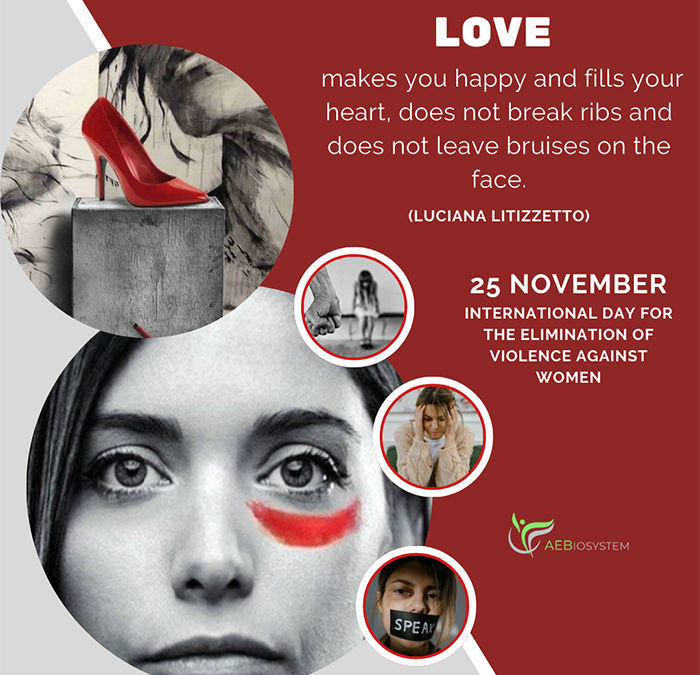AEB against violence against women – 25 November 2022
Today 25 November marks the International Day Against Violence Against Women to remember all women victims of violence, where violence means all forms of expression. This is to not forget the past, made of events that have left their mark, and not to leave the victims alone with their memories.
Sharing their stories is a valuable contribution to the culture of respect.
A respect that goes beyond the differences of gender, race, orientation because violence is to be rejected in all its forms.
In forms of violence the freedom and serenity of a person is limited and outraged by the will and power of the aggressor. The core is the concept of power. Violence is an act of power that does not always see the use of physical force or threats, but can be veiled, as if the author uses his age, physicality, social and economic status to act on the victim. Specifically, sexual violence is defined as any sexual activity with a person who does not want. It’s sexual assault rape, even if the perpetrator is the partner, any unwanted sexual contact, unwelcome exposure of a naked body, exhibitionism and voyeurism, abuse, incest, sexual harassment.
In forms of violence the freedom and serenity of a person is limited and outraged by the will and power of the aggressor. The core is the concept of power. Violence is an act of power that does not always see the use of physical force or threats, but can be veiled, as if the author uses his age, physicality, social and economic status to act on the victim. Specifically, sexual violence is defined as any sexual activity with a person who does not want. It’s sexual assault rape, even if the perpetrator is the partner, any unwanted sexual contact, unwelcome exposure of a naked body, exhibitionism and voyeurism, abuse, incest, sexual harassment.
Specifically, harassment refers to any unwanted behavior with sexual, physical, verbal and non-verbal connotations, which offend the dignity of the victim in the home, study and work environment. Examples include implicit or explicit requests for offensive or unwelcome sexual performance, exposure of pornographic material, adoption of sexist criteria in establishing relationships, unwanted physical contact, offensive comments on sexual orientation.
In rape, however, the central element is consent because it refers to a complete non-consensual sexual act. Consent is either absent or obtained by the use of physical force, coercion, deception or threats. The victim may also be incapacitated or unconscious for voluntary or involuntary use of drugs.
Finally, in sexual abuse the central element is contact because sexual abuse means any type of non-consensual sexual contact.
These dynamics occur not only in the domestic sphere, but also in the working and professional sphere, where victims often for fear of retaliation in the workplace, close in their silence in order not to lose what they worked for and fought for. Often women find themselves working in environments of negative competition, experiencing experiences of exclusion and marginalization, where their speech and opinion is often the least heard. Where their upbringing is often also misunderstood.
Harassment is the promise of facilities and privileges or career advancements in exchange for sexual performance as are threats and retaliation following the refusal of sexual performance. Verbal appreciation of the body and the way of dressing is also harassment.
The culture of respect concerns every age, every place and every profession so that every environment and every context is free from fear and suffering. It is a culture to spread in the school world because the children of now will be the people of tomorrow. It is a culture to be spread in the world of work, in company policies, in the relationships between superiors and colleagues so that every person feels free to express their thoughts without fear.
Only respect will make the term “violence” disappear.
Article written by Doctor Giovanna Giarrusso

